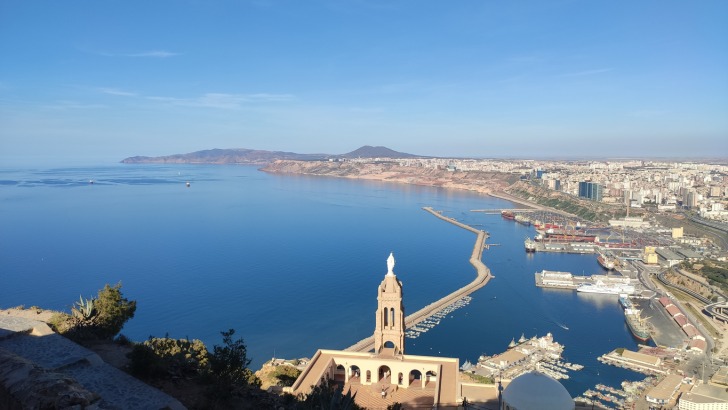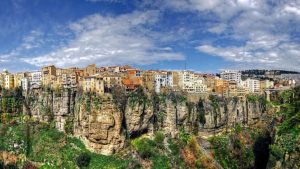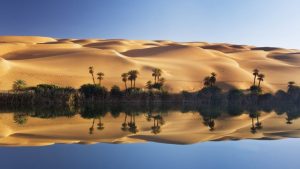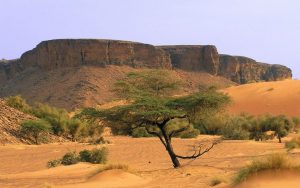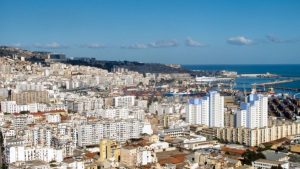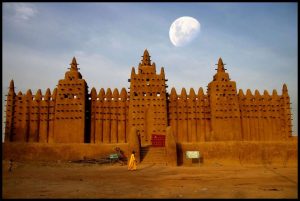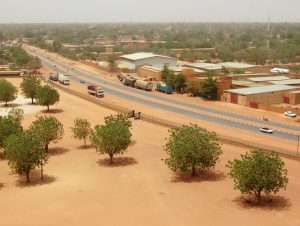Sharing borders with Morocco, Tunisia, Libya, Mali, Mauritania, Western Sahara, and the Mediterranean Sea, Algeria is the largest African Country.
Although Algeria’s recent history has been darkened by civil wars, the country is slowly rebuilding and restoring order.
Algeria’s rich historical and cultural tapestry has prompted a new wave of tourists in recent years.
The country is best known for the ancient ruins left by the Byzantine, Roman, and Phoenician eras.
Many believe that no other country offers tourists a better Saharan Desert experience!
Oran is a Mediterranean-facing city in the northwestern part of the country that’s flanked to the southeast by the Sebkha of Oran, a large lake assisting with crop irrigation in the area.
While the second city of Algeria offers vast historical and cultural treasures, the area is plagued by terrorism and other dangers.
Before traveling to Oran, it’s important to understand the safety levels and precautions you can take to visit without any incidents.
Keep reading to learn more!
Warnings & Dangers in Oran

OVERALL RISK: HIGH
Oran and the entire country are continuously rocked by terrorism, with terrorist cells being the biggest fear in this North African country. Despite the constant threat of terrorist activity, Oran continues to have tourists and it is possible to visit without incident, you just need to be vigilant and cautious. If you see suspicious behavior, then it’s important to report it immediately to local authorities.

TRANSPORT & TAXIS RISK: HIGH
Mass transit is not safe for tourists in Oran since visitors always stand out as targets on buses, trains, and on the street. Pickpocketing on mass transit is also common, so never fall asleep, or you may wake up empty-handed. Taxis are more reliable, but it’s important to arrange them before visiting or having your hotel call reputable companies while in the city.

PICKPOCKETS RISK: HIGH
Pickpocketing and petty theft are common in Oran, so it’s crucial not to flash valuables and try not to look wealthy, especially when walking around the city. Algeria is a developing country where most residents earn low wages, so flashing credit cards, money, or expensive cameras and jewelry is not advisable.

NATURAL DISASTERS RISK: LOW
Natural disasters are not a major concern when visiting Oran. Northern Algeria is in a seismically active zone, so earthquakes are the biggest natural disaster threat. On occasion, the area will receive major rainstorms that can lead to flooding, but this is not a reason to cancel your trip.

MUGGING RISK: HIGH
Violent crime has been increasing lately, especially due to the global inflation spike. Muggings are common in Oran, with criminals being the most active once the sun goes down. To lower the risk, always avoid deserted areas and dark streets at night.

TERRORISM RISK: HIGH
Terrorism is the biggest threat in the country, with countless terrorist cells operating in the two biggest cities of Algiers and Oran. Terrorists often conduct attacks and kidnappings of tourists and locals. The greatest threats are Al-Qaeda, Al-Murabitun, and Daesh-affiliated organizations. These groups are threats across the entire country, including Oran.

SCAMS RISK: HIGH
Given the development nature of Oran, many scams exist, including the tour guide scam. This involves men posing as tour guides and are only con artists trying to scam you for money. Also, when exploring the city, be aware of those attempting to distract you for pickpocketing and taxis overcharging you. Additionally, be extra cautious around ATMs and when handling money, as you never know who is watching.

WOMEN TRAVELERS RISK: MEDIUM
Although Oran is generally safe for women traveling alone, it’s advisable to be accompanied at night. Also, avoid deserted or remote areas during the day or night, don’t handle money in public, and don’t flash expensive items. Also, it’s crucial to follow the local dress codes to not draw additional attention.

TAP WATER RISK: MEDIUM
The tap water in Oran is chlorinated and considered somewhat safe but could cause mild abdominal upsets. To ensure you don’t get sick, it’s advisable to drink bottled water the first few weeks of your stay until your body adjusts the local water through showers, drinks with ice, and washed raw foods, like salad. If you plan to venture outside of the city, then it’s critical to drink boiled or bottled water, as the sanitization methods are limited.
Safest Places to Visit in Oran
The safest areas of Oran are also the most expensive, like Les Palmiers, Hasnaoui, and Canastel, or closed residential neighborhoods that have private security to protect residents.
Many Westerners visit Oran and don’t have any problems as long as they use common sense and steer clear of crime-ridden neighborhoods and those with bad reputations.
There are plenty of safety tips you can follow and precautions you can take to ensure a safe and enjoyable journey to Oran.
Places to Avoid in Oran
While there are some places to visit in Oran that are safe, it’s advisable to avoid neighborhoods like Esseddikiya, Sidi el Houari, and el Hamri, especially at night.
Other places to avoid are Wahran, which is one of the most dangerous areas in the country, and Kabyle, especially for Americans.
These areas are considered unsafe due to active terrorist groups and other criminal organizations, so visitors are advised to stay away.
Unfortunately, women are likely to be harassed, regardless of where they go in the city.
It’s always best to just ignore the catcalls and comments and keep moving along.
Safety Tips for Traveling to Oran
While Oran is a wealth of culture and history, it’s important to follow these safety tips to ensure you have an incident-free trip:
- Avoid Demonstrations. Demonstrations and other protest types are subject to different restrictions, so always take precautions to ensure your personal safety by avoiding demonstrations. While these may appear peaceful at first, they can escalate and become violent quickly. If you can’t avoid them, follow the instructions provided by the local authorities.
- Avoid Photographing Sensitive Sites. Don’t take photographs of airports, government infrastructure, military installations, or the police. The security levels across the country are high, and civil workers don’t take it lightly when you choose to disobey the law.
- Carry Medical Supplies for Personal Use. The medical facility standard varies across the country with the best locations in major cities. While you can find adequate medical treatment in Oran, locations in remote areas outside of the city may be limited or non-existent. Private health services are much better than government-funded public healthcare, so it’s crucial to pay for travel insurance.
- Don’t Travel to Remote Areas. Some criminals dress as police and set up illegal roadblocks in remote areas so that when you stop, they hijack your car or rob you. If you’re planning to leave Oran, go with a tour guide or experienced driver who can ensure your safety when traveling between locations.
- Don’t Visit Deserted Beach Areas. Deserted beach areas are subject to robbery and carjacking. Many criminals are opportunistic, so don’t give them the chance to conduct a criminal act with nobody around, even during the day. Instead, visit popular and frequented beaches to avoid this issue.
- Drink Bottled Water. Your body gets used to drinking tap water in Oran, but you could be mildly sick when first visiting the country. It’s always advisable to drink bottled water or boil tap water to kill bacteria. Those with sensitive stomachs or who are visiting for a short period should purchase bottled water, not order raw foods like salad, and don’t order drinks with ice. It is not advisable to drink tap water in remote areas as the sanitization levels are poor.
- Follow Local Dress Standards. Although Algeria is a conservative Muslim country, the government has not set rules regarding the dress code. However, the rules are imposed through social norms, so tourists cannot wear whatever they want all the time. For instance, women must cover their shoulders and head when visiting religious places but are not required to do this in public. Regardless, it’s important to dress modestly by wearing long dresses, pants, and covering your shoulders. Oran is the most liberal city in the country, so you are able to wear less conservative garb but dress accordingly when you leave the city.
- Have Local Contacts Readily Available. Given Algeria’s instability, it’s crucial to have the basic emergency numbers programmed into your phone including the police and fire departments, poison control, ambulance, and other services. It’s also critical to know the location of your home country’s embassy in case there are any issues.
- Stay at International Hotels. Given the constant terrorism and kidnapping threats, always stay at international hotels because they employ a separate level of security who are hired to protect the guests. While you may be fine staying in a hostel or ma and pa hotel, they won’t provide the necessary security as with an internationally branded establishment.
- Use Insect Repellent. Insect-borne diseases are common in Oran and across the country including malaria, West Nile Virus, leishmaniasis, and chikungunya. To ensure you don’t catch a disease from an insect, consistently apply insect repellent, wear light-colored, long, and loose clothing, and ensure your accommodation is insect-proof. It’s also advisable to take malaria pills before traveling to Algeria.
So... How Safe Is Oran Really?
Although the political situation is slowly improving, which equates to fewer protests and demonstrations that become violent, there continue to be many precautions that visitors must take when traveling to Oran.
Although terrorism is high in many places, you can attempt to avoid it to ease your mind when visiting.
Unfortunately, terrorist organizations operate in major cities and remote areas, so you are not entirely disconnected from threats in Oran.
Surprisingly, terrorism isn’t the biggest threat; it’s the kidnapping of Westerners, which occurs everywhere, especially near the borders.
Oran is no exception, as kidnappings occur regularly, which is why it’s important to remain in public places during the day or at night.
While Western governments advise against visiting Oran, if you must go, it’s important to avoid traveling anywhere at night when criminals are more active.
Also, don’t go down minor roads at nightfall, as you can easily get lost and be hijacked.
Overall, Oran’s safety index is much lower than other countries, so travel should be avoided.
How Does Oran Compare?
| City | Safety Index |
|---|---|
| Oran | 31 |
| Algiers | 50 |
| Annaba | 44 |
| Ghardaia | 48 |
| Tamanrasset | 30 |
| Atakor | 52 |
| Manama (Bahrain) | 54 |
| Tianjin (China) | 67 |
| Brussels (Belgium) | 60 |
| Shanghai (China) | 66 |
| Belize City (Belize) | 37 |
| La Paz (Bolivia) | 52 |
Useful Information

Visas
Few countries can enter Algeria without applying for a visa, so check your country’s website for confirmation. Also, ensure your passport is valid for six months after your entrance date into the country.

Currency
The official currency is the Algerian Dinar. As the country continues to advance, banks and ATMs are available around Oran, most of which accept major foreign cards.

Weather
Given its location on the Mediterranean coast, Oran experiences a milder climate compared to the desert areas of the south. However, summers are incredibly hot and dry with winters experiencing more comfortable temperatures.

Airports
Ahmed Ben Bella (Oran International) Airport is the main airport serving the city. The airport is located only 12 kilometers south of Oran in the town of Es Senia. Oran International is the second airport in the country after Algiers – Houari Boumedienne Airport.

Travel Insurance
Travel insurance is always recommended when visiting any country. In addition to covering the costs of lost baggage, travel delays, and other unexpected situations, travel insurance covers medical issues, loss of valuables, and theft.
Oran Weather Averages (Temperatures)
Average High/Low Temperature
| Temperature / Month | Jan | Feb | Mar | Apr | May | Jun | Jul | Aug | Sep | Oct | Nov | Dec |
|---|---|---|---|---|---|---|---|---|---|---|---|---|
| High °C | 17 | 18 | 20 | 22 | 24 | 28 | 31 | 32 | 29 | 26 | 21 | 18 |
| Low °C | 5 | 6 | 8 | 10 | 13 | 17 | 20 | 20 | 18 | 14 | 9 | 6 |
| High °F | 63 | 64 | 68 | 72 | 75 | 82 | 88 | 90 | 84 | 79 | 70 | 64 |
| Low °F | 41 | 43 | 46 | 50 | 55 | 63 | 68 | 68 | 64 | 57 | 48 | 43 |
Algeria - Safety by City
| City | Safety Index |
|---|---|
| Algiers | 50 |
| Annaba | 44 |
| Atakor | 52 |
| Ghardaia | 48 |
| Oran | 31 |
| Tamanrasset | 30 |
